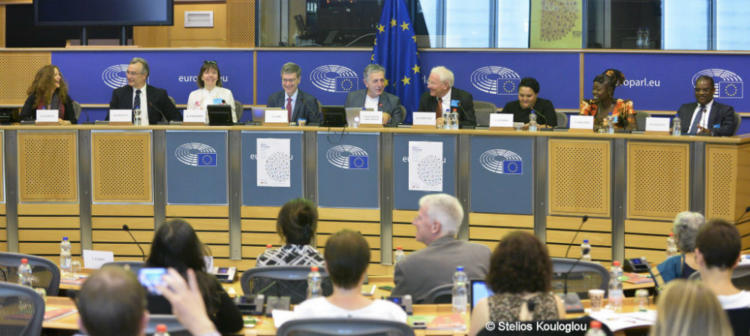
Above: Prof. Doris Schroeder
Below: Dr Kate Chatfield
Professor Doris Schroeder and Dr Kate Chatfield, from the University of Central Lancashire (UCLAN) and the TRUST Project, discuss a fresh new ethical framework and a global code of ethics, which was recently adopted by the European Commission for Horizon 2020.
Public health can be advanced with knowledge we already have and with public health research. Tuberculosis, HIV/Aids, Hepatitis and Malaria are still the four main causes of death from communicable diseases globally. All four are predominant in low-resource settings. India, Indonesia, China, Philippines, Pakistan, Nigeria, and South Africa make up 64% of the global disease burden for tuberculosis.
Research efforts are essential, especially since target 3.3 of the Sustainable Development Goals is: by 2030, end the epidemics of AIDS, tuberculosis, malaria and neglected tropical diseases and combat hepatitis, water-borne diseases and other communicable diseases.
A new ethical framework for public health research in resource-poor settings has been developed to counter “ethics dumping”, the export of unethical research practices from high- income to low- or middle-income settings. Fairness, respect, care and honesty.
These values were identified as the cornerstones of ethical research by a broad range of stakeholders, including indigenous peoples from the Kalahari and sex workers from Nairobi. The TRUST project consortium promotes the values as a new framework for ethical decision-making in research, health care, and potentially any other discipline or profession.
An alternative framework called Principlism already exists. Beneficence, non-maleficence, autonomy and justice are the principles, which form American scholars Tom Beauchamp and James Childress’ framework. Healthcare professionals and health researchers must aim to do good, avoid doing harm, respect the right of individuals to make decisions for themselves, and ensure that people are treated fairly.
Introduced almost 40 years ago, Principlism has most certainly proven valuable, as evidenced by how the framework has been adopted across health care professions, and beyond, to guide professional practice and research. However, the principles have received their fair share of criticism. Objectors have pointed out that they are specifically concerned with actions and do not take the intentions or the virtue of the actor into account.
Additionally, they are perceived as being ‘explicitly American in nature’ and hence they cannot be easily applied across cultures. For instance, the principle of autonomy, upheld as a liberal ideal in America, has a very different interpretation in cultures where the collective voice is also regarded as important, or where elders in the community expect to grant permission before individuals are approached for research.
A new Global Code of Conduct for Research in Resource-poor Settings, based on the values of fairness, respect, care and honesty, aims to take the Euro-American bias out of the ethics framework. It focuses specifically on the concerns of vulnerable communities when they engage in collaborative research with high income country partners. For instance, indigenous peoples from the Kalahari felt stigmatized and disrespected through US-funded research. The wellbeing, health and life of poor Indian women were put at risk in US-funded research.

Discussion of the Global Code at European Parliament Workshop, 29 June 2018, from left Dafna Feinholz, Dorian Karatzas, Doris Schroeder, Jeffrey Sachs, Stelios Kouloglou, Klaus Leisinger, Leana Snyders, Joyce Adhiambo Odhiambo, Michael Makanga
What do the four values mean?
1. Fairness
To treat people equally and without discrimination. Fairness can have a number of interpretations but the most relevant for collaborative research ethics is fairness in exchange. For instance, if one party in a collaboration donates genetic samples, which may have a commercial value, it is unethical not to allocate benefits to local populations. This happened in a case in China.
2. Respect
To have due regard for the customs, wishes or rights of others. Respect requires an acceptance that people’s customs and cultures may be different from one’s own, and that behaviour should not cause offence. It means that one may need to accept a decision or a way of approaching a matter, even if one disagrees. An obvious example from the San Code of Research Ethics asks researchers not to come into indigenous people’s communities and take photos of breastfeeding mothers without permission.
3. Care
To have regard, affection or consideration for researchers who take good care combine two features: they care about research participants, in the sense that they are important to them, and they feel responsible for the welfare of those who contribute to their research, or might suffer as a result of it.
For instance, a careful researcher from a high-income country will seek the assistance of local research ethics committees to ascertain whether a study is ethical in the local context; the researcher will not, as in a case in Liberia, undertake research without approval and then try to obtain it retrospectively when it is needed by publishing houses.
4. Honesty
To be truthful and trustworthy. In all cultures and nations, ‘do not lie’ is a basic prerequisite for ethical human interaction. However, the value of honesty has a broader scope in the context of global research ethics. Lying is only one possible wrongdoing. For instance, in research ethics it is equally unacceptable to omit important information from an informed consent process. Most prominently, the duties of honesty are vital for research integrity which include issues such as credit for contributions, manipulation of data or misappropriation of research funds.
The four values have greater global applicability than the four principles of beneficence, non-maleficence, autonomy and justice. They also emphasise the relationship between actors and their actions. Values motivate and engage people to discharge obligations or duties.
Will the new framework be successful? Time will tell, but signs are promising. The Global Code was recently adopted by the European Commission to support their efforts against ethics dumping. In a NATURE news piece, Ron Iphofen, an adviser on research ethics to the European Commission, expressed his views. He believes the code will have a profound impact on how funding proposals to the EU are designed and reviewed. “I could envisage reviewers now looking suspiciously at any application for funds that entailed research by wealthy nations on the less wealthy that did not mention the code,” he said.
The new moral framework was also used by the San people in South Africa to develop the first code of conduct for research written by an indigenous group in Africa and the media coverage was global and very high-profile. Leana Snyders, the Director of the San Council recently said: “The code has helped us A LOT. Now we can point to the values and the code and tell researchers what is not acceptable. It has given us a new, much needed language”.
Professor Doris Schroeder is Director of the Centre for Professional Ethics, UCLAN and Lead of the TRUST project.
Dr Kate Chatfield is Deputy Director of the Centre for Professional Ethics, UCLAN.



